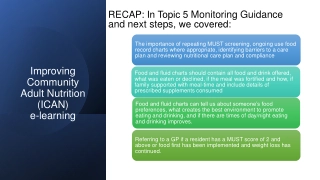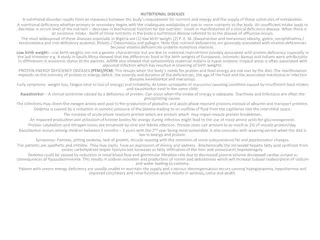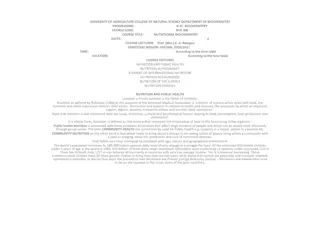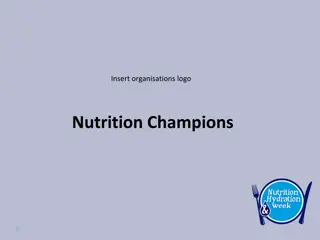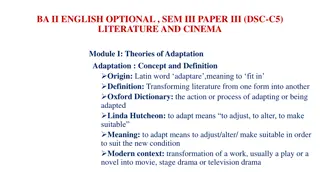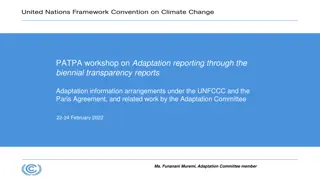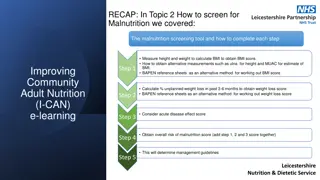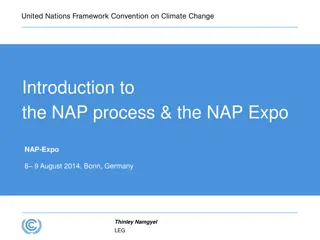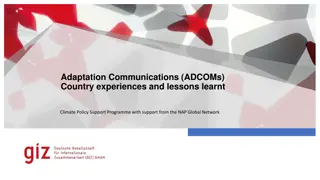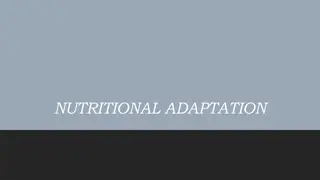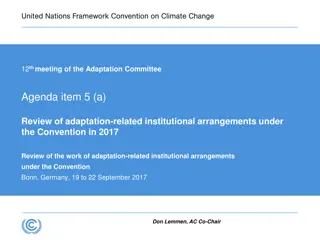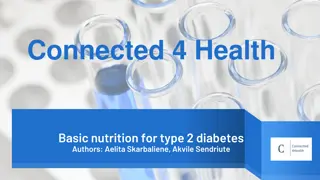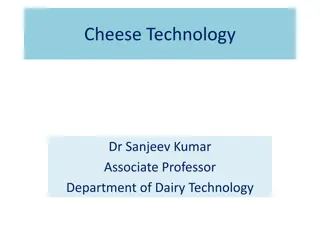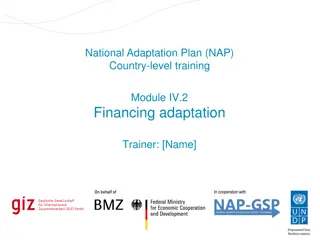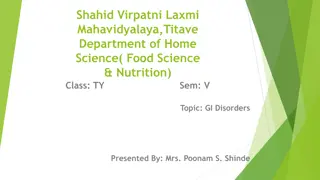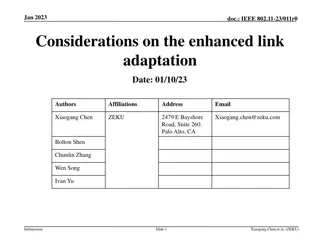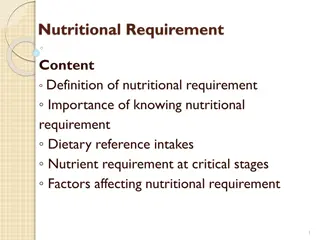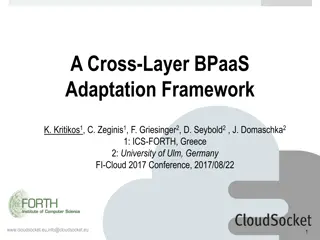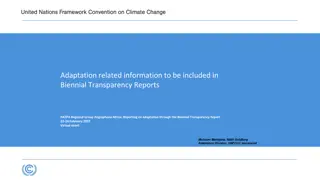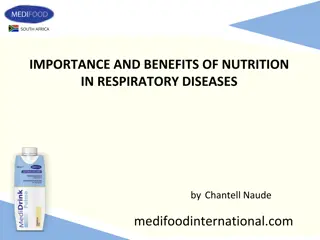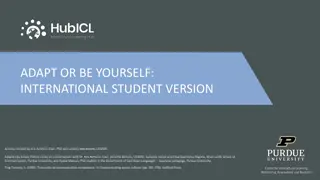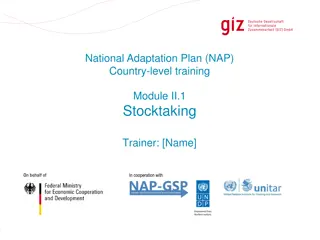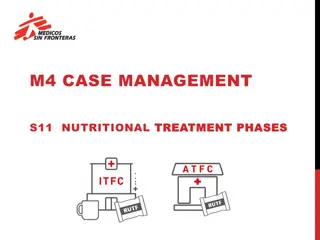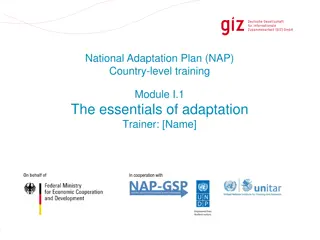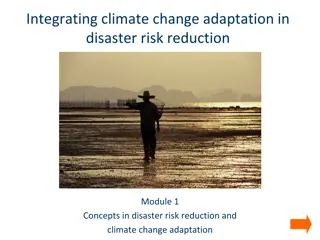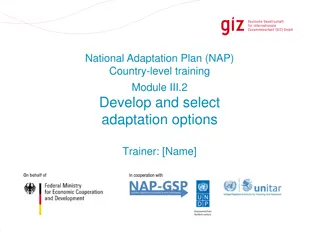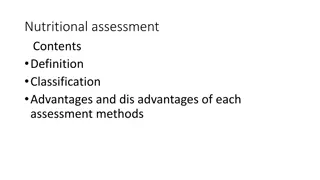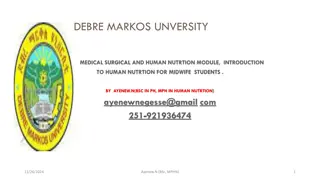Importance of Monitoring Guidance in Nutritional Care
This recap covers the significance of regular screening, using food record charts, identifying barriers to care plans, and reviewing nutritional compliance. It emphasizes the ICAN e-learning module and the key factors influencing nutritional care. The content highlights the importance of adequate fl
0 views • 16 slides
Understanding the Urgency of Adaptation Planning and Financing for Climate Change
Exploring the critical need for adaptation planning and financing through National Adaptation Plans (NAPs) and Nationally Determined Contributions (NDCs) to address the adverse impacts of climate change. The content highlights the gaps, challenges, and the widening finance deficit in developing coun
2 views • 21 slides
Overview of Nutritional Diseases and Disorders
Nutritional diseases arise from imbalances between the body's nutrient and energy requirements and their supply. Nutritional deficiencies can lead to clinical diseases, while excessive intake can result in diseases of affluence. Common nutritional disorders include low birth weight, PEM, obesity, go
4 views • 6 slides
Understanding Nutritional Biochemistry: A Comprehensive Overview of Nutrition and Public Health
Nutrition, as defined by Robinson, explores the relationship between food and the human body's functioning. This course delves into key topics such as nutrition in pregnancy, childhood, and the elderly, as well as nutrition-related diseases. It emphasizes the importance of public health nutrition in
1 views • 7 slides
Nutrition Champions: Improving Nutritional Care in Health and Social Settings
Nutrition Champions play a vital role in promoting food and drink as essential components of care packages in various settings. Their goal is to enhance nutritional and hydration care, share best practices, facilitate behavior change, and improve access to healthy food and fluids. The content discus
1 views • 21 slides
Theories of Adaptation in Literature and Cinema
The concept of adaptation involves transforming literature from one form to another, such as from a play or novel into a movie or television drama. Various approaches and theories of adaptation exist, including perspectives from theorists like Linda Hutcheon, Bela Balazs, and Andre Bazin. These theo
0 views • 9 slides
Workshop on Adaptation Reporting under the UNFCCC and Paris Agreement
Workshop on Adaptation Reporting through the Biennial Transparency Reports and related work by the Adaptation Committee under the UNFCCC and the Paris Agreement, focusing on arrangements for reporting and communicating adaptation information. The workshop covers various initiatives, guidelines, and
0 views • 7 slides
Exploring Adaptations of Reef Specialists
Delve into the evolution and adaptation of reef specialists in Lesson 5 of Coral Oceans at Home Science for ages 11-14. Discover specific adaptations used by coral reef species, the necessity of adaptation for survival, diverse adaptation strategies on the reefs, and create the ultimate coral animal
0 views • 20 slides
Understanding Malnutrition Screening and Nutritional Care Planning
In this overview, discover the process of screening for malnutrition, including calculating BMI, assessing weight loss, and determining overall malnutrition risk. Explore how to create a nutritional care plan based on the MUST score and set appropriate nutritional aims for patients.
0 views • 12 slides
Enhancing Nutritional Security in SADC Communities through Sugar Fortification
Nutritional security is crucial for overall well-being, and this presentation explores the significant role of sugar fortification in improving micronutrient intake and combating malnutrition in SADC regions. Insights into the current status quo, strategies for enhancing micronutrient intake, and th
0 views • 15 slides
Gender and Climate Change in Agriculture: Impacts and Adaptation Strategies
This workshop explores the intersection of gender and climate change in agriculture, emphasizing the importance of considering gender dynamics in adaptation planning. It covers the effects of climate change on men and women in agriculture, reasons for gender-sensitive adaptation planning, global and
0 views • 10 slides
Climate Change Adaptation Programming Strategy and Priorities
This content discusses the Climate Change Adaptation programming strategy, goals, and thematic priorities for vulnerable developing countries. The strategy aims to increase resilience to climate change impacts through long-term measures, strengthen capacities, and integrate adaptation into policies
2 views • 6 slides
Understanding the National Adaptation Plan Process
The National Adaptation Plan (NAP) process, established in 2010, aims to help Least Developed Countries (LDCs) formulate and implement NAPs to address medium- and long-term adaptation needs. Guidelines for NAP formulation and implementation have been provided, with a focus on reducing vulnerability
0 views • 11 slides
Understanding Adaptation Communications in Climate Policy Support Programs
Adaptation Communications (ADCOMs) play a crucial role in the implementation of the Paris Agreement by enabling countries to report on their adaptation priorities, plans, and support needs without burdening developing country Parties. ADCOMs serve to enhance visibility, strengthen adaptation actions
2 views • 13 slides
Understanding Lactose Intolerance and Nutritional Adaptation
Lactose intolerance is the inability to digest lactose in milk. This condition is prevalent among adults due to decreased lactase production. Symptoms include bloating, cramping, gas, diarrhea, nausea, and vomiting. Learn how lactose intolerance is a natural human adaptation and discover the geograp
0 views • 22 slides
Review of Adaptation-Related Institutional Arrangements Under the Convention in 2017
The 12th meeting of the Adaptation Committee in Bonn, Germany, focused on reviewing adaptation-related institutional arrangements under the Convention in 2017. Recommendations were made to enhance coherence and respond to the evolving needs of Parties, including assigning future work to existing ins
0 views • 4 slides
Nutritional Recommendations for Type 2 Diabetes Management
Regularity and consistency in diet are crucial for individuals with type 2 diabetes to maintain stable blood sugar levels. The new nutritional pyramid recommended by the Ministry of Health of the Republic of Lithuania emphasizes the importance of balanced nutritional choices for managing diabetes. N
0 views • 15 slides
The Role of the Adaptation Committee in Promoting Adaptation Technologies
The Adaptation Committee serves as an advisory body focusing on enhancing adaptation actions under the Convention. It aims to provide support, share information, promote synergy, and offer recommendations to incentivize adaptation actions. The committee's ambitious three-year work plan includes acti
0 views • 7 slides
Cultural Adaptation: Understanding Culture Shock and the Adaptation Process
Cultural adaptation involves facing culture shock when living abroad, experiencing various symptoms like homesickness and conflict, understanding cultural variations in body language and perceptions, and going through stages of adaptation from fun and excitement to biculturalism. Tips and insights a
0 views • 17 slides
Understanding Cheese: Technology, Classification, Legal Standards, and Nutritional Value
Dive into the world of cheese with insights on its technology, definitions, classification, legal standards, and nutritional composition. Discover how cheese is made, categorized, regulated, and its key nutritional components.
0 views • 16 slides
Understanding Climate Financing for Adaptation: NAP Country-Level Training
Explore Module IV.2 on financing adaptation in National Adaptation Plans (NAP). Learn about tracking climate financing, determinants of financing strategies, potential funding sources, and activities that require funding for adaptation. Discover the Climate Public Expenditures and Institutional Revi
0 views • 17 slides
Optimizing Nutritional Support for Upper GI Cancer Patients: Insights and Strategies
High prevalence of malnutrition in upper GI cancer patients highlights the importance of early nutritional screening and intervention. The role of prehab clinics in enhancing outcomes is gaining momentum. Insights from previous experience in nutritional screening reveal both advantages and challenge
2 views • 15 slides
Understanding Peptic Ulcers: Causes, Symptoms, and Nutritional Management
Shahid Virpatni Laxmi Mahavidyalaya conducted a presentation on gastrointestinal (GI) disorders, focusing on peptic ulcers. The content covers the etiology, symptoms, and nutritional management of peptic ulcers, emphasizing the importance of proper diet in managing this condition. Peptic ulcers, cha
0 views • 8 slides
Enhancements in Link Adaptation for IEEE 802.11 Standards
Discussions in the Jan. 2023 document focus on enhanced link adaptation considerations for IEEE 802.11 standards, particularly in 11be and 11ax. Various improvements and challenges in link adaptation are highlighted, emphasizing the need for enhanced link adaptation (ELA) to address issues like inte
0 views • 14 slides
Understanding Nutritional Requirements and Their Impact
Exploring the definition and importance of nutritional requirements, as well as the Dietary Reference Intakes, critical stages for nutrient needs, and factors influencing nutritional requirements.
0 views • 174 slides
A Cross-Layer BPaaS Adaptation Framework Overview
This framework addresses the problematic issues of flexibility and cost reduction in Business Processes as a Service (BPaaS) by monitoring and adapting BPaaS in a cross-layer manner. It focuses on handling the entire lifecycle of BPaaS and covers adaptation mechanisms for different layers in the clo
0 views • 17 slides
Reporting on Adaptation in Biennial Transparency Reports: Insights from Anglophone Africa
Explore the integration of adaptation-related information in Biennial Transparency Reports for Anglophone Africa, presented during a virtual event. Learn about key guidelines, criteria, and potential synergies between National Adaptation Plans and Biennial Transparency Reports to enhance effectivene
0 views • 10 slides
Importance and Benefits of Nutrition in Respiratory Diseases
Nutrition plays a crucial role in respiratory diseases such as COPD and CF, with malnutrition affecting a significant percentage of patients. Poor nutritional status is linked to increased morbidity and mortality in these patients, impacting pulmonary health and muscle function. MediDrink Pulmo offe
0 views • 7 slides
Understanding Adaptation Across Cultures
Explore the concept of adaptation in diverse cultural contexts, discussing the importance of adapting, decision-making processes, and the impact of adaptation. Engage in introspective activities to enhance transcultural communication competence. Derived from Ting-Toomey's work, delve into personal e
0 views • 38 slides
National Adaptation Plan (NAP) Stocktaking Training Overview
This training module provides insights into the importance of stocktaking in the National Adaptation Plan (NAP) process. Participants will learn about different stocktaking methods, utilizing stocktaking results for NAP development, and identifying gaps and needs. The session covers subjects like po
0 views • 14 slides
Improving Patient Outcomes through Frailty Support Project
This project, funded by the Carmarthenshire Intermediate Care Fund, aimed to provide flexible, person-centered care to support patient mobility and nutritional needs. Frailty workers implemented various strategies such as frailty snack boxes, daily frailty logs, grip strength assessments, and nutrit
0 views • 8 slides
Understanding Nutritional Treatment Phases in Pediatric Malnutrition
This session covers the different phases of nutritional treatment in pediatric malnutrition programs, focusing on objectives, specifics, and criteria for transitioning between phases. An illustrative case of Annika, a 3-year-old in the Transition Phase, is provided for practical application and unde
0 views • 5 slides
Essential Training on National Adaptation Planning
This training module focuses on enhancing understanding and capacities for National Adaptation Planning (NAP) processes. It covers the basics of climate change, adaptation concepts, challenges, and the importance of adaptation for development. Through interactive sessions and case studies, participa
0 views • 16 slides
Integrating Climate Change Adaptation in Disaster Risk Reduction Module 1
Welcome to the e-Learning module on integrating climate change adaptation in disaster risk reduction. This module covers concepts in disaster risk reduction and climate change adaptation. It is part of a package that includes five modules focusing on vulnerability, disaster risk reduction, climate c
0 views • 29 slides
Climate Change Adaptation Programming Strategies and Priorities
This content discusses the Global Environment Facility's (GEF) programming for climate change adaptation, focusing on strategies, funding sources, and thematic priorities. It outlines the goals, objectives, and core pillars of adaptation programming, emphasizing the integration of climate change ada
0 views • 11 slides
Developing and Selecting Adaptation Options in National Adaptation Plans: A Training Module
This training module focuses on the importance of selecting and prioritizing adaptation options in the National Adaptation Plan (NAP). It covers different assessment approaches, criteria for selecting options, decision support tools like Cost-benefit Analysis (CBA), and the necessity of prioritizing
0 views • 15 slides
Neonatal Nutrition: Growth, Nutritional Support, and Management Phases
Neonatal nutrition, specifically focusing on growth faltering and early nutritional support, is crucial for the well-being of premature infants. Understanding growth rates and providing appropriate nutrients are key goals. Target growth rates and reference growth curves are important considerations.
0 views • 28 slides
Understanding Nutritional Assessment Methods
Nutritional assessment involves evaluating the nutritional status of individuals through various methods such as anthropometry, biophysical assessments, clinical evaluations, and dietary analysis. Anthropometric measurements, such as weight and recumbent length, play a crucial role in assessing grow
0 views • 48 slides
Understanding Food and Nutritional Toxicology
Food and nutritional toxicology delve into the science of poisons, toxins, and toxicants found in food. It covers substances harmful to consumers, including natural toxicants, contaminants, and additives. Nutritional toxicology focuses on the overlap between nutrition and toxicology, exploring the i
0 views • 17 slides
Introduction to Human Nutrition for Midwife Students at Debre Markos University
This course on Human Nutrition addresses the importance of maintaining health and preventing diseases through proper nutrition. It covers topics such as nutrient impact on health, nutritional problems, assessment methods, intervention approaches, and surveillance. Upon completion, students will be e
0 views • 100 slides
